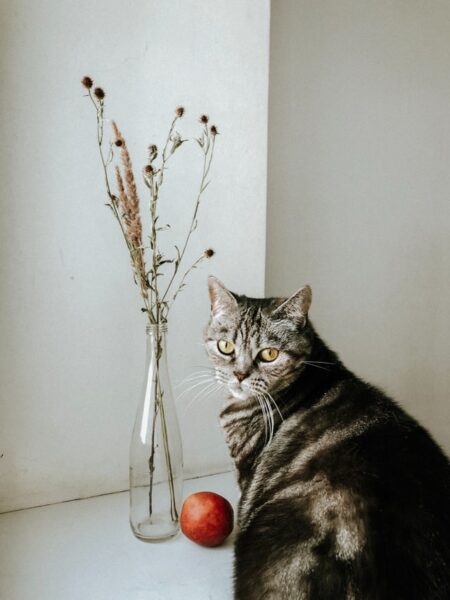With my collection of orchids, succulents, and cats growing every day, I found myself wondering, are succulents poisonous to cats? Probably should have thought about this before buying 3 jade plants. After some delayed extensive research, I decided to share what I found.
People have increasingly become more interested in owning house plants for home decor. Owning houseplants has become a hobby. However, this recent trend can be dangerous for pet owners. It’s important to research the types of house plants you want before purchasing. Your pets are ultimately your number one priority.
Pairing cats with plants can be a difficult feat. Cats are known to eat everything nearby. Furthermore, they are likely to claw and destroy things. Therefore, cat owners must be extra cautious when it comes to owning plants.
In this article, we will explore some of the best and worst house plants to buy. We will discuss whether they are toxic or non-toxic to your pets.
Are Succulents Poisonous To Cats?
Succulent plants have become very popular in recent years. This is mostly due to them being low maintenance, easy to care for, and most importantly very beautiful plants.
Succulents are thick, fleshy plants. They are built to store water. The list of succulent houseplants is endless. Therefore, it is impossible to classify them all as dangerous or safe succulents.
Many people assume that succulents are poisonous to cats. However, this isn’t necessarily true. It’s fine to have most succulents around your cats.
Nonetheless, there are some varieties of succulents that are harmful to cats. Often ingesting them only leads to nausea, vomiting, and diarrhea. However, this means that pet owners need to be especially careful when choosing these types of plants.
It is important to do proper research when buying a succulent. Although most of these are safe, not all are.
Aloe Vera
Despite having many health benefits to humans, aloe vera is known to be mildly toxic to cats and dogs. Although not typically lethal, side effects to aloe vera include vomiting and diarrhea.
Burro’s Tail
Although the burro’s tail is considered non-toxic, this plant can irritate some skin, especially in sensitive areas like the mouth. It is a good enough reason to put these plants in a hanging pot. Not only do they look great in a hanging pot, but it also protects their fragile arms. Burro’s Tail side effects are typically only mild skin irritations.
Panda Plant
The ‘Panda Plant’ is a common succulent house plant. These can be quite dangerous to cats. Cats can have diarrhea and vomiting if they ingest this plant.
Devil’s Backbone
The ‘devil’s backbone’ also known as the mother of millions, is another common house plant. These are also dangerous when ingested. The symptoms include nausea, vomiting, diarrhea, and abnormal heart rate.
Jade Plant
The jade plant is a beautiful bushy shrub-like succulent with plump oval leaves. However, if you have pets, you may want to skip jade plants, as it is hard to hang or otherwise keep safe from pets. Jade plants cause typical side effects that include vomiting, diarrhea, elevated heart rate, and other gastro issues.
Pencil Cactus
The pencil cactus may not be a typical houseplant but it is not uncommon to see them in people’s yard. However, due to the severity of the side effects of contact with this plant I decided to include it. The pencil cactus is toxic to everyone, this includes cats, dogs, kids, and YOU. If you come into contact with the milky sap it produces you can be left with a rash in less than a minute. It is also known to cause temporary blindness when it comes in contact with the eyes. When ingested this plant can cause vomiting, diarrhea, and other stomach issues. This is definitely one to skip, even if you do not have pets or children.
Snake Plant (Mother in Law’s Tongue)
The snake Plant or Mother in Law’s Tongue is prevalent in the homes and offices. This is largely due to the snake plant doing so well in lowlight conditions. However, the snake plant is toxic to both humans and animals when ingested. It is known to cause nausea, vomiting, diarrhea, and numbing of the mouth.
It is highly unlikely that a cat will die from eating a succulent. However, they may get very sick. Therefore, it is best to research plants before purchasing them. Don’t let this list scare you because there are many more safe succulents than unsafe. If you think your animal is sick from ingesting a plant, please call the ASPCA animal poison control center.
Are Orchids Poisonous to Cats?
Contrary to popular belief, orchids are not actually poisonous to cats. This is a rumor that was started years and years ago.
However, cats are naturally drawn to flowers. Many symptoms appear when they eat them in large quantities. For example, they often get upset stomachs. This is not actually due to the properties of the orchids themselves.
A lot of research was conducted pertaining to this theory. However, there is no direct correlation to cats getting sick from eating orchids.
Although orchids are not poisonous to your cats, eating them in large quantities is harmful. Therefore, pet owners should take precautions when buying this plant.
Ways To Keep Your Plants Safe
You may have come here asking,” are succulents and orchids poisonous to cats”. The real question may be, “are cats poisonous to succulents and orchids”. Here are a few tips on keeping your plants safe.
Create a specific room for just plants. Ensure that your cat won’t have access to this room. This is a great way to ensure that they won’t get eaten or their leaves destroyed. However, not everyone has the space to do this.
Keeping plants in cages is a definite way to keep your cat and succulents safe. Wire and metal crates are the best options. This is because they are still able to get enough sunlight. Furthermore, the cages allow them to get adequate water.
Another trendy idea is to use a birdcage. These are more aesthetically appealing than big, bulky wire cages. There are tons of decorating ideas all over the internet.
Keeping plants on shelves is another great idea. This way they are out of reach. However, you must still make sure that the plant is getting adequate sunlight.
Putting sticks or skewers into a plant can deter a cat from attacking it. This is because this makes it unattractive to play with.
Keep Your Cats Entertained
Cats are very playful by nature and are known to be the most curious of all pets. Therefore, pet owners should ensure that they are always entertained.
Your cat is less likely to eat plants if they are entertained by other things. This can be done in a multitude of ways.
For example, having specific cat toys is helpful. Another common trick is to purchase other types of plants that cats love. These should be safe for them to consume. The idea is that they will then leave the succulents alone.
Here is a list of cat-friendly plants:
- Nepeta Mussinii – Many people refer to this plant as “catmint.” This plant is easy to care for and can be grown indoors or outdoors. They are very beautiful when they bloom.
- Boston Fern – These plants have beautiful vines. This makes them perfect to put in hanging baskets. Furthermore, cats love them.
- Nepeta Cataria – This is the most common house plant that cats love. It is popularly referred to as “catnip.” There are many stimulating properties associated with this plant. Accordingly, it gives them a boost of energy.
Buy Plants That Cats Hate
There are many plants that cats hate having around. This is usually due to its smell. Having them will protect all of the others in the area.
This is a natural way to keep your greenery safe. Furthermore, many of these plants are beautiful and smell great.
Here is a list of plants that cats tend to hate:
- Rosemary – This smell is often too strong for pets. This proves to be one of the most protective plants.
- Citrus – Strong scents of citrus deter pets from engaging with it
- Lavender – This is a smell that humans love. However, most pets can’t seem to stand it
- Rue – Many people use this herb to cook. Therefore, having it in the house serves many purposes.
- Coleus Canina – This plant has a very distinct smell. It can be unappealing to humans as well. Many people refer to this plant as the ‘scaredy-cat plant.’
Conclusion
Cats are the most likely animal to destroy your indoor plant collection. They are curious creatures and they like to play constantly.
Research has shown that orchids are not toxic to cats and dogs. Most succulents are also not toxic to cats and dogs. However, there are some that can be dangerous.
It is important to always research plants before purchasing them. Furthermore, taking necessary precautions is vital for the health of your cat and plants. Check out my other entry about rare houseplants if you wanna know more about indoor plants to buy.
If your pets are showing symptoms of poisoning. Immediately call the ASPCA animal poison control center at 888 426 4435.






